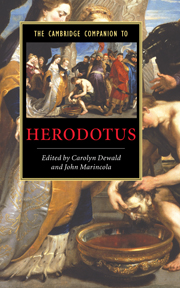Book contents
- Frontmatter
- Introduction
- 1 Herodotus and the poetry of the past
- 2 Herodotus and his prose predecessors
- 3 Herodotus and tragedy
- 4 The intellectual milieu of Herodotus
- 5 Meta-historiē: Method and genre in the Histories
- 6 The syntax of historiē: How Herodotus writes
- 7 Speech and narrative in the Histories
- 8 Herodotus, Sophocles and the woman who wanted her brother saved
- 9 Stories and storytelling in the Histories
- 10 Humour and danger in Herodotus
- 11 Location and dislocation in Herodotus
- 12 Herodotus and the natural world
- 13 Herodotus and Greek religion
- 14 Warfare in Herodotus
- 15 Herodotus, political history and political thought
- 16 Herodotus and the cities of mainland Greece
- 17 An alternate world: Herodotus and Italy
- 18 Herodotus and Persia
- 19 Herodotus and foreign lands
- 20 Herodotus' influence in antiquity
- Glossary
- Timeline
- Bibliography
- Index
- Series List
7 - Speech and narrative in the Histories
Published online by Cambridge University Press: 28 January 2007
- Frontmatter
- Introduction
- 1 Herodotus and the poetry of the past
- 2 Herodotus and his prose predecessors
- 3 Herodotus and tragedy
- 4 The intellectual milieu of Herodotus
- 5 Meta-historiē: Method and genre in the Histories
- 6 The syntax of historiē: How Herodotus writes
- 7 Speech and narrative in the Histories
- 8 Herodotus, Sophocles and the woman who wanted her brother saved
- 9 Stories and storytelling in the Histories
- 10 Humour and danger in Herodotus
- 11 Location and dislocation in Herodotus
- 12 Herodotus and the natural world
- 13 Herodotus and Greek religion
- 14 Warfare in Herodotus
- 15 Herodotus, political history and political thought
- 16 Herodotus and the cities of mainland Greece
- 17 An alternate world: Herodotus and Italy
- 18 Herodotus and Persia
- 19 Herodotus and foreign lands
- 20 Herodotus' influence in antiquity
- Glossary
- Timeline
- Bibliography
- Index
- Series List
Summary
Logos is reason; logos is speech. There are of course good reasons why the same word captures what in English are distinct concepts. Internalised 'reasoning' is often figured in a way parallel to external conversation and debate; and if an idea or a projected course of action 'has logos', echei logon, it is 'reasonable' in that it is capable of being presented in convincing argument.
Yet in Herodotus these two 'senses' of logos - or, better, these two English ways of capturing different aspects of the concept - often stand in a problematic relation to one another. How 'reasonable' is a 'speech'? Speakers are struggling to make sense of events, to gauge what is happening - and also (not necessarily the same thing) to gauge what they should wisely say about those events. The text's readers and listeners are doing something similar, constantly measuring a speaker's words against the narrative which the text has given or will go on to give. And there is another reason too not to divorce speech from action, for in an important sense speeches are action. They play their part - often initiating, often responsive - in a chain of events; and they also build up a behavioural pattern of how deliberation works, often differently in different parts of the world or in different political systems. That is especially important in Herodotus, where the dynamics of logos operate in different ways in the autocratic courts of the East and in the diverse political systems of Greece, especially in the fragile alliance of states which confronts the invader.
- Type
- Chapter
- Information
- The Cambridge Companion to Herodotus , pp. 103 - 121Publisher: Cambridge University PressPrint publication year: 2006
- 31
- Cited by

